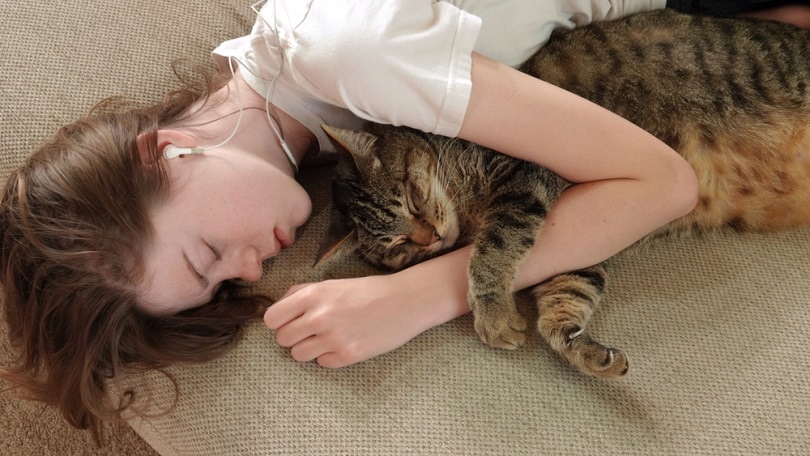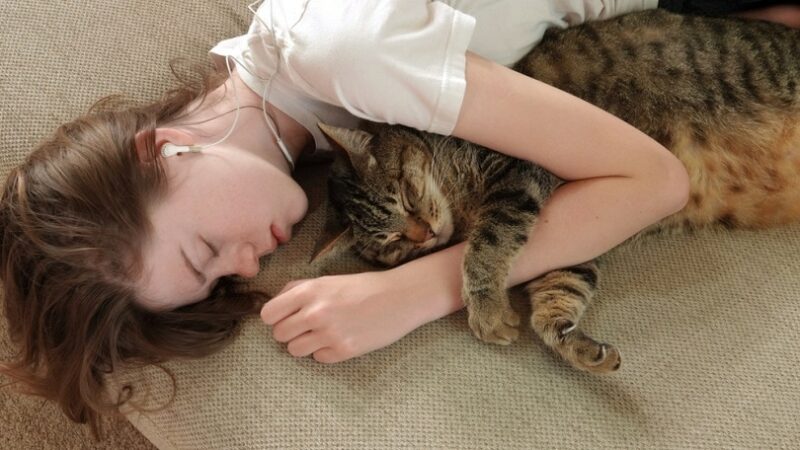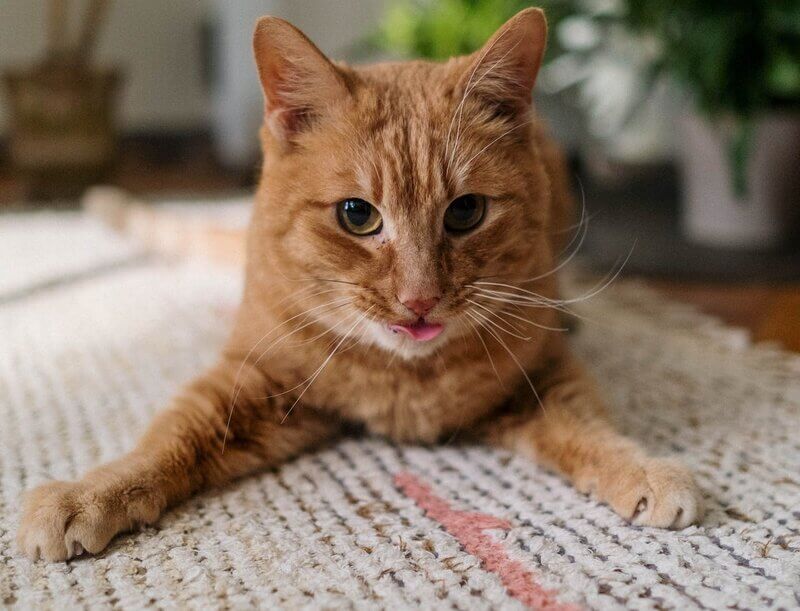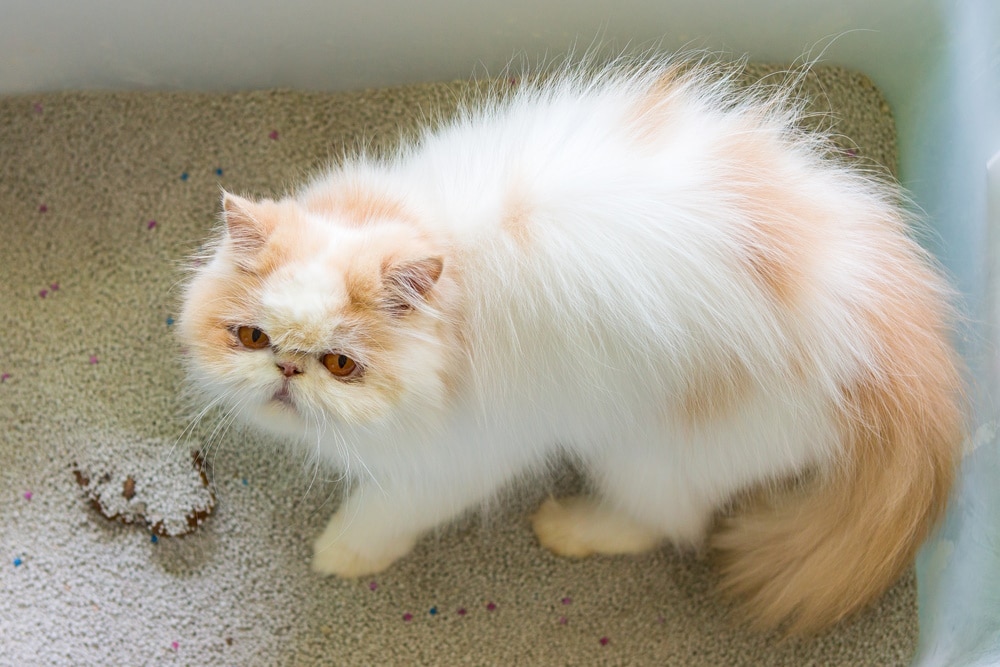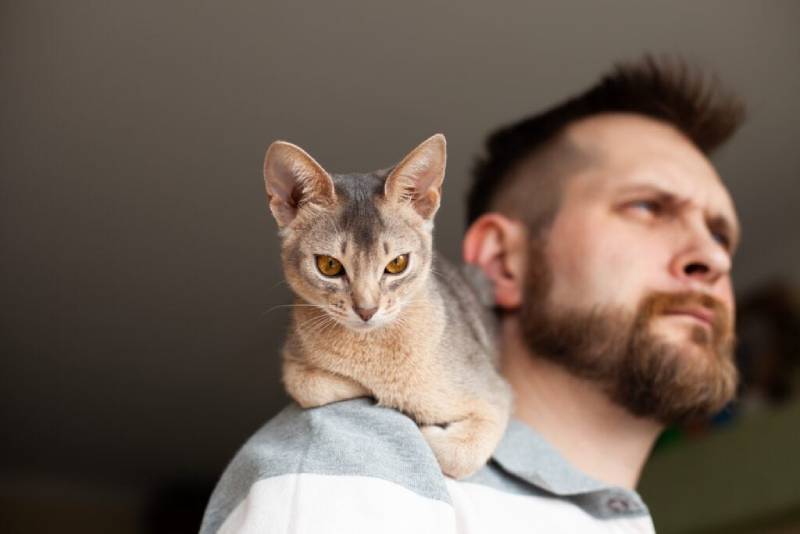Is there a better feeling than having your cat cuddle up next to you in bed or on the couch? Since cats have a reputation for being independent and aloof, it can feel like you’ve hit the lottery when they choose to snuggle up to you. But have you ever wondered, “Why do cats cuddle?” Is it because they love us, or are they tricking us into letting our guard down so they can finally take over the world? Read on to find the answers to your most burning questions about cuddly cat behavior.
Why Is My Cat So Cuddly?
Cats enjoy cuddles for many of the same reasons humans do. Here are some of those reasons:
- Warmth. Cats love to be warm, and there’s no cozier place in your home than on your lap, especially if you have a warm blanket within reach.
- Safety. Cats won’t settle down for a nap unless they feel they’re safe from harm and potential predators that may be about. If yours chooses to cuddle into you for nap time, know that they trust you wholeheartedly and that you’re providing them with a safe place.
- Attention. Though cats are often considered to be aloof creatures, you’ve likely found out in your time as a cat owner that this isn’t true of every individual kitty. Some have a deeply rooted desire for attention, and cuddling is a great way to grab your attention if you’ve been paying less attention to them than they prefer.
- Cuddle time is a productive bonding time in a cat’s eyes. Your kitty relies on you to provide them with the necessities of life, and through snuggling, they’ll show you how much they love and appreciate all you do for them.

Why Won’t My Cat Cuddle?
If you’re reading this blog with a slight twinge of jealousy because your pet doesn’t do cat snuggles, know that you’re not alone. Not all cats enjoy snuggling, and those falling into this category may find you trying to force them into cuddles threatening and uncomfortable.
You need to understand that your kitty likely isn’t resisting your cuddle advances because they dislike you. They may be resistant to snuggles for a variety of reasons, including improper socialization, mistrust of humans, or just a personality hardwired not to enjoy cuddle time. There are plenty of other ways your pet will show their affection for you, however, including:
- Head bunting you
- Bringing you gifts (e.g., toys)
- Licking you
- Nuzzling you
You can show your affection for your kitty in a number of ways, including offering treats, giving pets, and playing with them.
How Can I Get My Cat to Cuddle Me?
As a cat owner, you probably know as well as anybody that you can’t force your cat to do anything. If you’re upset that your kitty isn’t as cuddly as the ones you see on TikTok, know that it probably has nothing to do with you. It’s just the way they were born!
While we don’t recommend forcing a cat with an aversion to cuddles to snuggle you, there are some things you can do to encourage them to explore their cuddly side a little more.
- Use friendly body language. Use slow, calm, and deliberate movements around your pet. Don’t stare them directly into their eyes as it can be seen as threatening to some cats. Speak calmly and in a soft voice, and avoid making any sudden movements.
- Offer plenty of pets. When your cat approaches you, reward them with the kind of pets you know they like. Behind the ears or under the chin is always a good spot to start, and please do not approach the belly area unless your kitty has given you the green light and you know they love it.
- Offer treats as rewards. When your pet is comfortable, they’ll start testing the waters a bit more seriously. They’ll jump up onto the couch next to you or sit beside you at your desk. Be sure to reward such behaviors with your cat’s favorite treats.
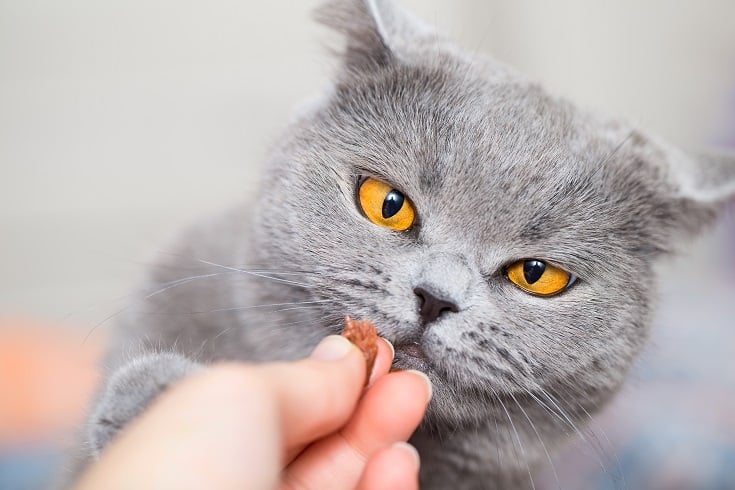
Why Are Some Cats Cuddlier Than Others?
There are two main reasons why some cats may be cuddlier than others: genetics and socialization.
Genetics
Though feline genetics is still an evolving field, there does appear to be some genetic component when it comes to cuddliness. Some breeds are naturally more likely to be cuddlers than others.
- Ragdolls
- Siamese
- Sphynx
- Scottish Folds
- Persians
- Tonkinese
- Maine Coons
- Burmese
Socialization
While genetics do play a role in a cat’s personality, how your pet was raised can also be a huge determining factor in their likes and dislikes.
Your pet’s earliest months are considered a critical part in their social development. Every experience they have during kittenhood will play a role in what their personality will be like as an adult. For example, cats that are held often and given plenty of positive reinforcement will be more likely to have sociability and confidence as adults. In contracts, cats exposed to traumatic experiences may be more likely to develop anxiety and aggression.
Why Do Cats Cuddle Each Other?
Is there anything as sweet as seeing your cats or kittens snuggling one another? We think not. As sweet and social media-worthy as it may be to witness your pets tangled up in one another, it’s important for us to understand why they cuddle with other cats in the first place.
Reinforcement of Social Structures
Cats are highly social creatures with complex social structures. It’s important to consider these structures as we look at why cats cuddle one another.
Cats have a social hierarchy based on numerous factors, including their age, gender, personality, and size. When you see cats cuddling each other, you may not realize it, but you’re witnessing their social position to one another. The dominant kitty will put their paw around the subordinate one, or the latter will sleep with their head on the former’s paw. These displays of submission and dominance help your pets maintain the essential social structure they’ve built within their group.
This is also why you’ll sometimes see cats grooming one another. This behavior isn’t just to help get each other clean, but it also strengthens their bond and further establishes the hierarchy in their group.
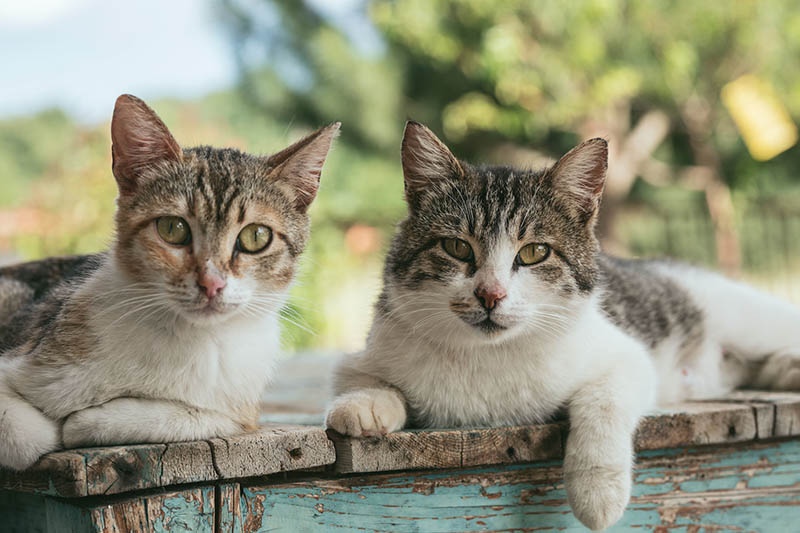
Bonding
Oxytocin is a type of hormone that promotes positive feelings. In humans, it has an essential role in behaviors like sexual arousal, trust, and romantic attachment. Studies show that cats also release oxytocin when they communicate with one another, suggesting that the hormone also plays an important part in how they bond.
When cats snuggle, they may experience a rush of oxytocin, helping to strengthen their bonds with each other and providing them with a sense of security in their relationship and social structure.
Final Thoughts
Cats cuddle for many different reasons, depending on who they’re cuddling with. If your pet is snuggling up to you, they may be seeking warmth, security, attention, or some one-on-one bonding time with you. If you witness your cats cuddling one another, they may be reinforcing their social hierarchy or just bonding with each other in the most adorable way ever.
Featured Image Credit: Simone Hogan, Shutterstock

